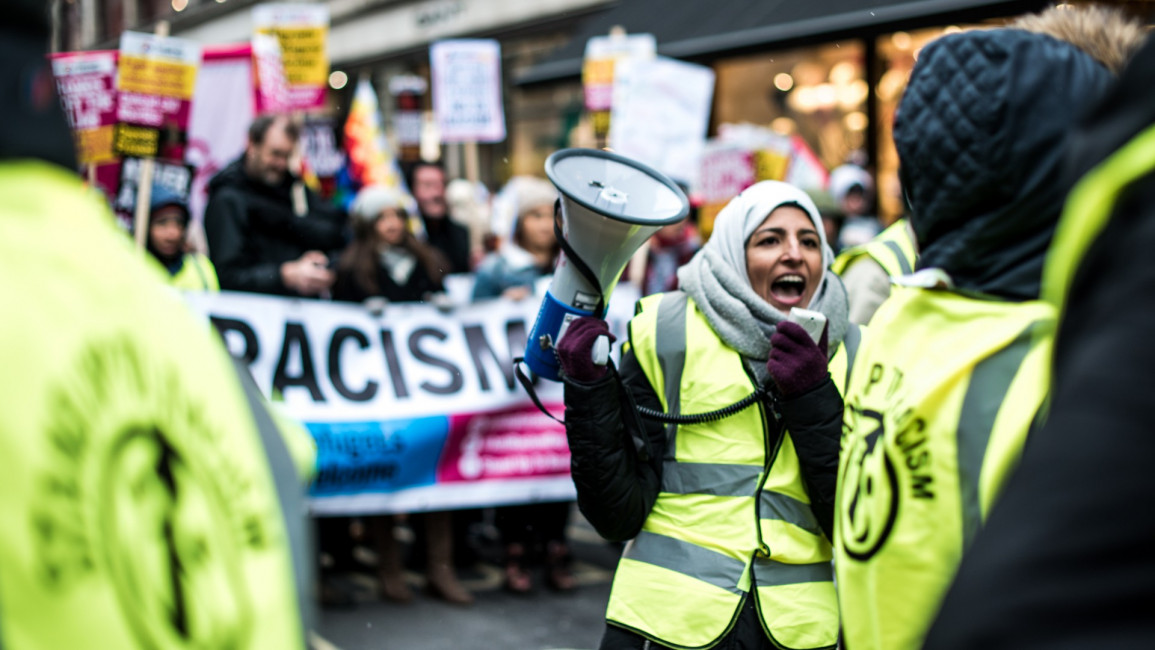Half of UK news stories about terrorism mention 'Muslims' in 'disproportionate coverage', new report finds
Half of UK news stories about terrorism mention 'Muslims' in 'disproportionate coverage', new report finds
A new report by the media arm of the MCB found that over the past year mainstream news outlets disproportionately linked terrorist events to Muslims.
3 min read
The study demonstrates media bias against Muslims when it comes to reporting on terrorism [Getty]
Newspapers in the UK have demonstrated a clear bias against Muslims when it comes to reporting on terrorism, a new study by the Muslim Council of Britain's Centre for Media Monitoring (CfMM) has found.
Between 2015 and 2019, 51 percent of individual online news pieces, in 31 mainstream British news publications, mention the term "terror", "terrorism", "terrorist(s)", and "Islam", "Islamic", "Islamism", or "Islamist" in the same piece.
In comparison, the total for "far-right", "white supremacist", "right-wing" and "neo-Nazi terrorist(s)" was only six percent.
The report claimed media coverage of terrorism has been "consistently inconsistent" and placed undue emphasis on Islam.
Journalists often used other descriptors aside from "terrorist" to describe crimes perpetrated by those linked to white supremacist ideology.
"How the British Media Reports Terrorism" looked at how 16 terrorist attacks in the US and Europe - as well as New Zealand's Christchurch massacre - had been reported.
The CfMM analysed more than 230,000 articles published over the four year period.
Rizwana Hamid, the director of CfMM, said there was a "disproportionate focus" on Muslims and that headlines using terms such as "Allahu Akbar", implying that "religion is always the motivator".
"Inconsistencies remain, with a disproportionate focus on Muslims. Worst of all, headlines using religious terms such as 'Allahu Akbar' imply that religion is always the motivator, ignoring other factors such as criminal history and mental health issues which may be at play, and which are often mentioned when the perpetrator is not Muslim," Hamid noted.
"However, in our interaction with editorial directors, managing editors, security correspondents and senior producers, there has generally been a willingness to reflect, and we hope our recommendations help improve standards for us all."
|
The report found a "reluctance" to describe white supremacist-linked events as "terrorist attacks" compared with "so-called Muslim counterparts".
"The coverage of terrorism post Christchurch 2019 shows that it is no longer correct to say that according to the media 'all' terrorists are Muslims," wrote one of the authors of the report, Faisal Hanif.
"Yet, the labels of 'terror', 'terrorist' and 'terrorism' are still overwhelmingly focused towards Muslim actors."
Hanif said that despite the threat posed by adherents to far-right and white supremacist ideology, some newspapers remain reluctant to designate attacks on Muslims and immigrants as "terrorist", even if there are clear political, religious or racist motives by the perpetrators.
"Others still frame the discourse to exonerate white attackers, placing the burden of their actions at the door of liberal governments, immigrants, the left, Muslims and Daesh inspired terrorists," Hanif said.
"One of the consequences of doing this has been the failure to trace the roots of white supremacist terrorism outside of designated timeframes such as post 9/11 or the 2015 mass migration to Europe of refugees fleeing war torn countries. The media is far behind academia in this respect."
Improvements?
The CfMM's damning report did however point to "significant improvements" in recent media coverage.
Last year "Muslim" and "Islam" were only used twice as often as "far-right", "neo-Nazi" or "white supremacist" in conjunction with the terms "terror", "terrorism" and "terrorist".
The Muslim Council of Britain published a set of 11 recommendations for UK media to follow, including "avoiding headlining the term 'Allahu Akbar' as shorthand for a terrorist attack" and "spurious links between normative Islamic practices and the crime of terrorism should be avoided".
Hanif urged media organisations to be more responsible in their reporting.
"Irresponsible and sensationalist reporting on terrorism feeds broader, divisive narratives designed to polarise communities and present a 'clash of civilisations' scenario," Hanif wrote.
"The lack of consistency in coverage of the various strains of terrorism highlights how these diverging narratives take shape and the broader consequences of such coverage.
"In failing to report on both the extent of the threat of the white supremacist threat and generating a narrative which has effectively made terrorism the preserve of one community, media institutions do a disservice to their audiences as well as compromise on the truth."



